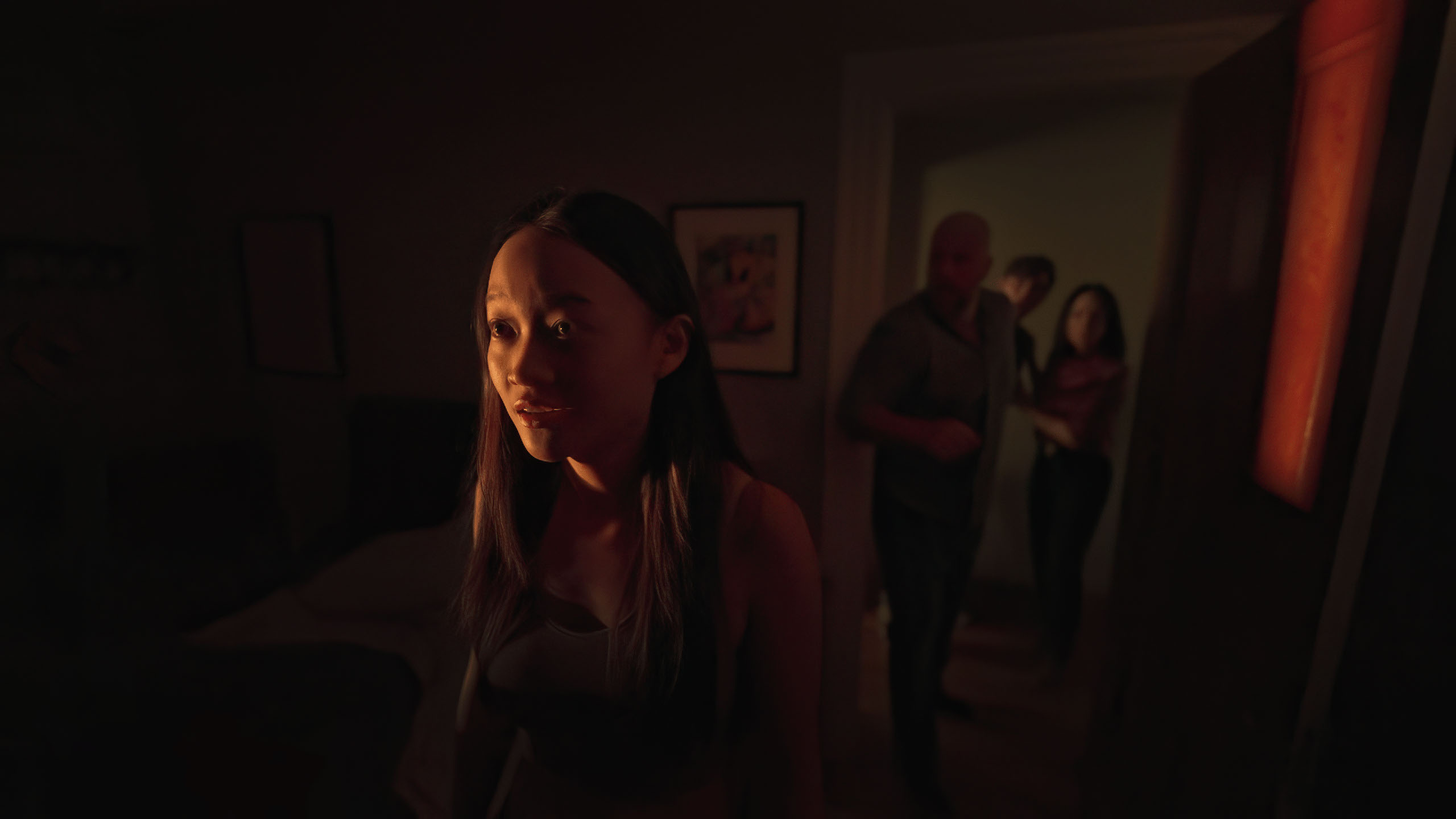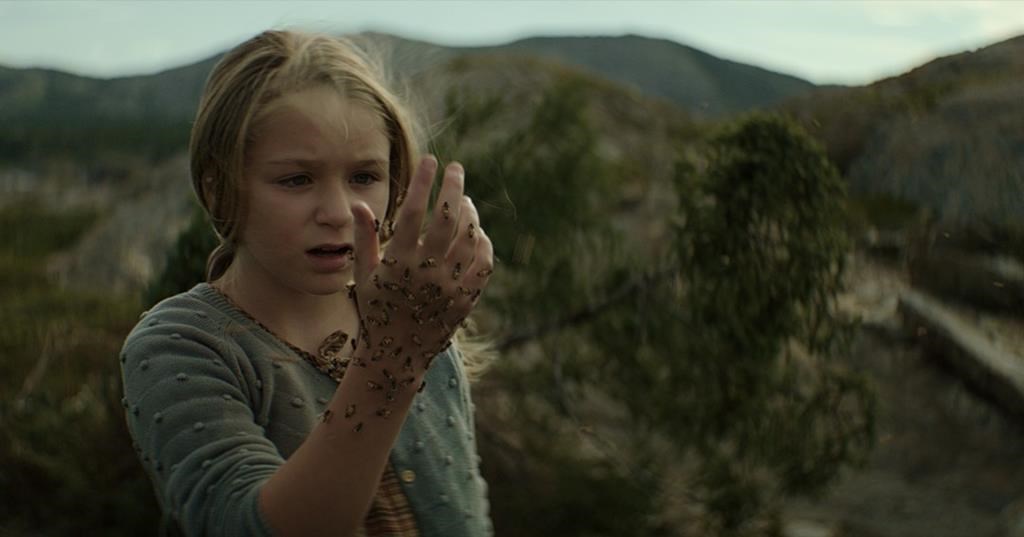Reviews
‘Presence’ Sundance Review – Steven Soderbergh’s Thrilling New Spin on the Haunted House Movie

Unsane director Steven Soderbergh reunites with Kimi screenwriter David Koepp (Stir of Echoes) to give an innovative new spin on the quintessential ghost story. Presence frames its haunted events entirely from the perspective of its ghost. From the opening frame until the end credits, audiences see the thrilling story unfold through chilling narrative twists via Soderbergh’s experimentation with form and technique. Using the camera’s gaze as the ghost’s observing eyes isn’t the only trick up Soderbergh and Koepp’s sleeves, ensuring this exciting shakeup of the haunted house keeps you guessing.
The opening moments introduce the single location, an affluent suburban home just recently on the market, through tracking camerawork that captures the feel of a ghost peering around its haunt. It quickly navigates the halls and rooms, giving a quick overview of the layout as it seeks out a new arrival in the form of a frazzled real estate agent (Julia Fox). Mere minutes after, she greets the family there to look at the new home on the market, introducing the central characters that come with ghosts of their own long before they realize their new home is already occupied by an otherworldly presence.
It’s here where Presence instantly lures you in; the ghost begins as a mere observer with no dirty secret or flaw gone unnoticed. Through the ghost’s eyes, we watch and start to piece together the dysfunction within the foursome. Rebecca (Lucy Liu) is the tough-as-nails mom with some shady parenting and work ethics, and her prized son Tyler (Eddy Maday) seems sure to follow in mom’s footsteps. Dad Chris (Chris Sullivan) is a tender-hearted parent at wits end on how to combat the callousness of his wife and son while deeply concerned about his depressed daughter Chloe (Callina Liang ). That Chloe just lost her best friend Nadia to a drug overdose, the second girl in their school to die this way, leaves Chloe more susceptible to the supernatural.
As the ghost is drawn to Chloe, Presence evolves. The entity becomes more than a voyeur; it becomes a realized character the more it’s drawn into Chloe’s sorrow. Soderbergh, working as cinematographer under pseudonym Peter Andrews, wields the camera in breathtaking ways that infuse the incorporeal character with personality. Soderbergh’s usual tracking shots follow the family’s inner turmoil, but the filmmaker plays with technique and form to capture its emotions. Through the camera, it’s clear when the ghost is angry, or upset, or franticly worried over Chloe. It’s the innovative pull of the ghost’s perspective that fully captivates and adds a layer of unpredictability.
While that ultimately makes this ghost of the not-scary variety, Soderbergh has plenty of surprises in store that ensure there are plenty of gasp-worthy moments and palpable dread. Koepp and Soderbergh touch on common haunted house tropes, like the arrival of a psychic to help them navigate their ghostly occupant, but it’s in the way they subvert to work around these tropes where Presence shines. The presence itself may not be something to fear, but that doesn’t mean Presence lacks any intensity or horror. The moody story builds into a thrilling finale that devastates.
Presence gives a contemporary, innovative new spin on the haunted house format that bypasses the well-trodden path to instead create scares of a different nature. Scares that could only work once its voyeuristic ghost, and the audience by proxy, has become entangled in the engaging and messy lives of a family foursome. Liu, Maday, Sullivan, and Liang fearlessly dig into their flawed roles and keep us invested in their turbulent lives, even if some of their discardable subplots are more to flesh out their personalities than story. Their performances prove just as vital as Soderbergh’s personality-imbuing camerawork. Combined with Koepp’s twisty script, Presence pulls you in, terrifies you, then leaves your heart on the floor. This ghost story doesn’t scare in the conventional sense, but it’s an innovative and grim nail-biter with more on its mind than the logline suggests.
Presence made its World Premiere at the Sundance Film Festival.


Reviews
‘The King Tide’: An Island Town Rots with Moral Decay in Canadian Folk Horror Fable [Review]

The opening scenes of director Christian Sparkes’ The King Tide set an ominous tone: a powerful storm takes down the power lines of a small island town as a pregnant woman loses her child while her dementia-suffering mother sits nearby. In the morning, as the town takes stock of the damage and the power is restored, a surprising discovery is found in an overturned boat in the harbour: a baby girl…with the ability to heal.
Writers Albert Shin and William Woods, working from a story by Kevin Coughlin and Ryan Grassby, treat the story as something of a morality tale mixed with a fable. Following the cold open, the action jumps ahead 10 years at a point when the unnamed island (the film was shot in Newfoundland, Canada) is thriving. The fishing is bountiful, the islanders are self-sufficient and have cut ties with the mainland, and most everyone is happy.
As characters are prone to saying, it’s all thanks to Isla (Alix West Lefler), the miracle baby who has grown up worshipped by the islanders. While Mayor Bobby Bentham (Clayne Crawford) and his wife Grace (Lara Jean Chorostecki) endeavor to raise Isla like any other little girl, the reality is that the island’s entire ecosystem revolves around her miraculous powers. It is only because of Isla that they survive; every aspect of their lives – from medicine to food – relies on her.
Each day the citizens line up for their allotted time with the young girl – be it to stave off breast cancer, like Charlotte (Kathryn Greenwood), or recover from another night of heavy drinking like former doctor, Beau (Aden Young). There’s even a predetermined schedule for when she will go out on the boats and use her power to lure fish into the nets.

One fateful day, Bobby succumbs to peer pressure and alters Isla’s schedule at the last minute to accompany cod fishermen Marlon (Michael Greyeyes) and Dillon (Ryan McDonald). A childish game with fatal consequences is played, but with Isla indisposed, a young boy, who would have otherwise been fine, dies. And while the rest of the community grieves, it is Isla who is completely shaken and, unexpectedly, loses her powers.
Suddenly the entire balance of the island is thrown off. Folks like Grace’s mother, Faye (Frances Fisher), who relied on Isla to keep her dementia at bay, suddenly reckon with mortality, while the food security of the town is called into question. Faye’s late-night “support group” meetings take on an urgent and secretive tone and the townspeople claim ownership of Isla’s time despite Bobby and Beau’s protests that she needs rest to recover from her trauma.
Like the best thrillers, the politics and personalities within the community come into play as morals are compromised and the good of individuals vs the collective is played out in increasingly desperate situations. The King Tide excels because it is interested in exploring the competing motivations of the townspeople, while also resolutely refusing to paint anyone as inherently good or bad. These are desperate people, determined to remain independent and free from outside interference, while protecting their trapped-in-amber way of life.

These developments work because there’s a humanity to the characters and The King Tide wisely relies heavily on its deep bench castoff character actors to drive the conflict. Crawford is the de facto protagonist of the ensemble and he’s also the most straightforward character: Bobby is a good man and a loving father, but he’s no white knight. At several points in the film, his willingness to acquiesce to the demands of the community and retain his power causes events to spiral further out of control.
Even more fascinating are Grace and Faye, two commanding women whose capacity for maternal love is matched – or eclipsed – by their own self-interests. A mid-film discovery about Isla’s power reframes Grace’s priorities, ultimately pitting her against her husband. As a result, Grace is incredibly compelling and frustrating (in a good way) and Chorostecki, who has done great genre work on both Hannibal to Chucky, plays the moral ambiguity exactly right. Grace is a fascinating and flawed human character in a film filled with them.
The same goes for Fisher, who deftly balances Faye’s grandmotherly love for Isla with the needs of the community and, by extension, her own health demands. In the hands of a lesser performer, it would be easy to hate Faye for her actions, but Fisher’s performance perfectly captures the fierce determination and fear that drives the island’s matriarch.
Finally, there’s Aden Young, The King Tide’s secret weapon. The ten-year jump reveals that Beau has undergone the most significant transformation: while everyone else has benefitted from Isla’s powers, her presence has eliminated the need for a doctor. With the clinic effectively shuttered, Beau has become an alcoholic; a shell of his former self with no purpose.
Like Bobby, Beau is the easiest character to root for because of his selfless desire to protect Isla, but Young (renowned for his work with Crawford on Rectify) unlocks the character’s tragic pathos and, in the process, becomes the film’s emotional anchor.

Framing the moral decline of the islanders and anticipating the unexpectedly devastating climax is the natural beauty of Newfoundland. As shot by cinematographer Mike McLaughlin, there’s a steely beauty to the geography, resplendent with rocky cliffs, pounding surf, and gusty bluffs that reinforce the islanders’ isolation.
There’s a fierce pride in their struggle to survive independently, evident in the simple lodgings and the antiquated alarm bell that is rung whenever fishing ships from the mainland stray too close. It’s a chilly, atmospheric calling card for one of the most picturesque provinces in Canada, but it is a perfect complement for the folk horror narrative.
Armed with serene, beautiful cinematography, murky moral developments, and a deep bench of talented character actors, The King Tide is a quiet gem that demands to be seen. It’s one of the year’s best genre films.
The King Tide is in theaters April 26, 2024.














You must be logged in to post a comment.